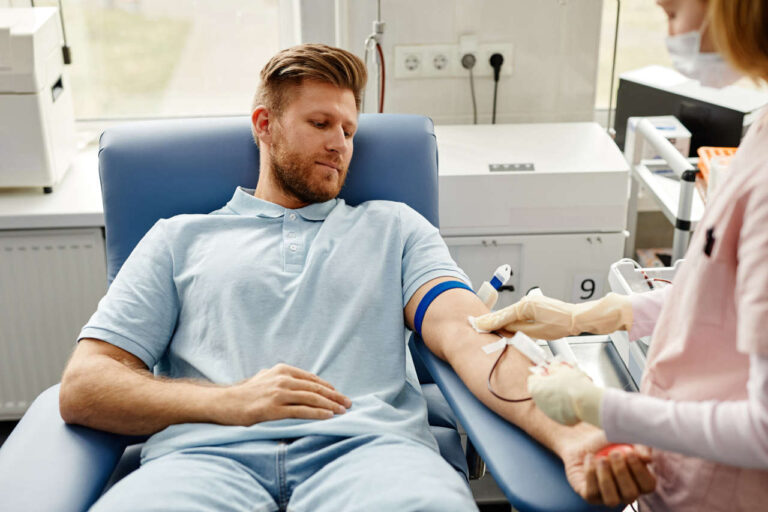
Though intravenous immunoglobulin (IVIG) products are equally efficacious, and all work to normalize the overactive or compromised immune system, they are not interchangeable, unlike typical generic drugs. Every IVIG brand is different in terms of composition, purification, and approved treatment for different medical conditions.
Speak to a Specialist About Copay Assistance
For example, Gamunex and Privigen are both IVIG products used to treat chronic inflammatory demyelinating polyneuropathy (CIDP). However, both products are manufactured by different pharmaceutical companies and have different characteristics such as composition, purification, formulation, and tolerability profiles.
Patients who experience a reaction to Gamunex may not have any reactions to Privigen with a different preparation. For this reason, IVIG products are considered non-interchangeable.
This article highlights key factors that further explain why IVIG products are not interchangeable.
What Are IVIG Products?
IVIG products are primarily biological agents that consist of a concentrated solution of immunoglobulins (antibodies) derived from the human plasma of thousands of healthy donors.
The US Food and Drug Administration (FDA) has approved around ten IVIG products so far for the treatment of autoimmune and immunodeficiency disorders, which are as follows:
- Asceniv
- Bivigam
- Carimune NF, Nanofiltered
- Flebogamma DIF 5% and 10%
- Gammagard Liquid and Gammagard S/D
- Gammaplex 5% and 10%
- Gamunex-C, Gammaked
- Octagam
- Panzyga
- Privigen
Each product is indicated for the treatment of various disorders caused by immune system dysfunction. Different pharmaceutical companies manufacture these IVIG products according to their standard manufacturing protocol, which makes the IVIG products universally not interchangeable.
Why Are IVIG Products Not Interchangeable?

There are several key factors that make IVIG products non-interchangeable.
Composition
The composition of IVIG products typically varies among the IVIG brands. Each IVIG product can have a specific immunoglobulin (antibody) type and concentration. For example, our body typically has five types of immunoglobulins: IgG, IgA, IgE, IgM, and IgD.
Among the immunoglobulins, IgG is the most abundant antibody in the human plasma and is a principal component of all IVIG products (present in 95% of the concentration).
Other antibodies, such as IgA and IgM, are present in trace amounts in IVIG products.
The primary antibody (IgG) also has four sub-types (IgG1, IgG2, IgG3, and IgG4), and it is possible that different IVIG products may contain varying proportions of IgG subclasses, IgA and IgM. This may also make IVIG products different in terms of their antigen specificity.
For example, if a patient has IgA antibodies, IVIG products with a low proportion of IgA, like Flebogamma or Gammagard S/D, may be prescribed. However, if a patient with IgA antibodies also has diabetes, then the IVIG product Gammagard S/D could be potentially life-threatening to diabetic patients as it contains glucose as a stabilizing agent.
Purification Process
Pharmaceutical companies may use slightly different purification methods (such as fractionation, precipitation, and chromatography) to purify the immunoglobulins from human plasma. Variations in the purification methods may influence the levels of impurities, such as aggregates, antibodies against blood group antigens, and cytokines, which may affect the safety and tolerability of the final IVIG product.
Get Your IVIG Dose – At-Home Infusion
Formulation
The formulation of IVIG products also differs in terms of pH, stabilizers, and osmolality. For example, IVIG brands like Gammagard S/D contain sugar (such as glucose) as a stabilizer and higher sodium content, which is not recommended for patients with diabetes, heart disease, or kidney disease. In contrast, Gammagard liquid does not contain any sugar or sodium content.
Though both IVIG products treat primary humoral immunodeficiency (PI) in adult and pediatric patients 2 years or older, they differ in sugar content, sodium content, pH levels, and osmolality (See Table 1).
Hence, these variations in the formulation of IVIG products influence their stability, shelf-life, and compatibility with patient physiology.
Since each product has a different formulation, it is recommended to consult your doctor before switching between IVIG products.
Table 1: IVIG Product Formulations
| IVIG products | IgA Content | Stabilizer | pH | Osmolality | Sugar & Sodium content |
| Gammagard Liquid (10% solution) | Average 37µg/mL | Glycine (300 mM) | 4.6-5.1 | 240-300 mOsmol/kg | No sugar No sodium |
| Gammagard S/D | <1µg/mL | Glycine (250 mM) Glucose (3g/dL) | 6.4-7.2 | 636 mOsmol/kg | Glucose (2 g/dL) |
| Gammaplex 10% | <20µg/mL | Glycine (200-300mM) | 4.9-5.2 | >240 mOsmol/kg | No sucrose or maltose Sodium: <30 mEq/L |
| Bivigam® | ≤200µg/mL | Glycine (200-290mM) | 4.0-4.6 | ≤510 mOsmol/kg | No sugar Sodium: 100-140 mEq/L |
| Flebogamma 5% | <50µg/mL | D-sorbitol (5 g/dL) | 5.0-6.0 | 240-370 mOsmol/kg | D-sorbitol (5g/dL) Sodium: trace amount |
| Flebogamma 10% | <100µg/mL | D-sorbitol (5 g/dL) | 5.0-6.0 | 240-370 mOsmol/kg | D-sorbitol (5g/dL) Sodium: trace amount |
| Gamunex | 46 µg/mL | Glycine (160-250mM) | 4.0-4.5 | 258 mOsmol/kg | No sugar Sodium: Trace amount |
| Octagam | ≤200 µg/mL | Maltose (10 g/dL) | 5.1-6.0 | 310- 380 mOsmol/k | Maltose Sodium: <30 mEq/L |
| Panzyga | Average 100 µg/mL | Glycine (200-260 mM) | 4.5-5.0 | 240-310 mOsmol/kg | No sucrose Sodium: Trace amount |
| Privigen | ≤25 µg/mL | L-proline (250 mM) | 4.6-5.0 | 240-440 mOsmol/kg | No sugar Sodium: Trace amount |
Conclusion
Unlike generic drugs, IVIG products are not interchangeable. Each IVIG product has a different composition (immunoglobulin concentration), undergoes a different purification process, and has a different formulation (stabilizer, pH, osmolality, or sodium content).
REFERENCES:
- Stacy Ness, P. D. (2019). Intravenous and Subcutaneous Immunoglobulin Treatment Options. Www.ajmc.com, 25. https://www.ajmc.com/view/intravenous-and-subcutaneous-immunoglobulin-treatment-options
- Arumugham, V. B., & Rayi, A. (2020). Intravenous Immunoglobulin (IVIG). PubMed; StatPearls Publishing. https://www.ncbi.nlm.nih.gov/books/NBK554446/
- Taking intravenous immune globulin (IVIG) product characteristics into consideration. https://www.gammagard.com/Content/hcp/pdf/product-characteristics.pdf
- Blood Transfusion: Intravenous Immunoglobulin Guideline. Www.rch.org.au. https://www.rch.org.au/bloodtrans/about_blood_products/Intravenous_Immunoglobulin_Guideline/#:~:text=IVIg%20products%20and%20presentations%20are%20not%20interchangeable.&text=Each%20product%20has%20different%20formulations
- Hooper, J. A. (2015). The history and evolution of immunoglobulin products and their clinical indications. LymphoSign Journal, 2(4), 181–194. https://doi.org/10.14785/lpsn-2014-0025
- Misbah, S. A. (2013). Should Therapeutic Immunoglobulin Be Considered a Generic Product? An Evidence-based Approach. The Journal of Allergy and Clinical Immunology: In Practice, 1(6), 567-572. https://doi.org/10.1016/j.jaip.2013.09.009












